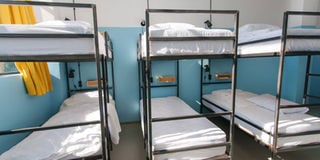70% boarding schools substandard, says government

Beds. Schools should only use single or double decker beds.
What you need to know:
Roles. Government says boarding section arrangement is purely facilitated by parents as government policy only emphasises access to quality education.
Kampala. The government has said about 70 per cent of the secondary schools are illegally operating boarding sections as they have not sought permission from the relevant agencies.
Ms Frances Atima, the assistant commissioner in the Directorate of Education Standards (DES), said the schools are licensed as day schools and that any institution which wants to have a boarding section must apply separately, be inspected and if they meet the minimum standards, be given authority to operate.
However, she said this boarding section arrangement is purely facilitated by parents as government policy only emphasises access to quality education.
“We already raised the red flag that many schools are operating boarding facilities without authority from the ministry. No school is registered as day and boarding other than the schools that are traditional which were there in the early years.
For those that have been registered in recent years, they are registered as day schools but given authority to have boarding section after applying. The boarding section is a responsibility of parents,” Ms Atima said.
“Unfortunately, most of our schools don’t comply. Of the 800 secondary schools we inspected in a certain period, only 30 per cent of the schools comply with the required standards. Most of them still operate without authority. Even some of those which have authority have flouted the rules and regulations,” she added.
A report on the inspected schools last year shows that 452 schools did not meet the minimum standards. According to the Uganda Gazette October 25, 2017, schools must have separate accommodation for each sex and age group, it should only use single or double decker beds, each dormitory must have two emergency exits, occupancy permit for every dormitory, a matron with a Primary Seven certificate with a minimum age of 30 who together with the school cooks must be medically examined after every six months and guards on a 24-hour surveillance.
Nkoma SS head teacher Yakoub Mwesigwa yesterday admitted that the inspectors were at his school last year and advised him to provide emergency exits for students’ hostels.
With 6,500 student enrolment, the government-aided school is registered as a day institution. However, on the parents’ request, about 350 students are in boarding, which he said they have reconsidered and will gradually phase out.
“This is a government day school but a boarding was an initiative from the parents. What the inspectors saw lacking here is what is lacking in normal schools across the country. They talked about adding more exit for emergency, they talked about water and we have removed burglars. There is a lot of pressure. People don’t want the boarding. We will remove it in phases,” Ms Mwesigwa said.
As a directorate, Ms Atima explained that they have developed closure and implementation notices which they will be issuing to substandard schools to ensure compliance.
The closure notice will be given on spot if they find that the school is unlicensed and does not meet the minimum requirements putting the lives of learners at risk while the implementation notice will be an agreement between the inspectors and the school authorities indicating what needs to be corrected and how long it should take them to rectify.
“It was difficult to enforce standards. Now that the guidelines have been gazetted, we can enforce them. The challenges are quite enormous. Most schools think that when you have a boarding facility, you get more income. Regardless of the conditions, schools are opting to have boarding facilities including our own government aided schools,” Ms Atima said.
“The government policy is clear that all schools are day schools. We want to have many children access education. Boarding facilities minimize access because it is expensive,” she added.
In addition, she said they have strengthened their inspection to twice a term to enable them follow up.
Ms Atima said while the directorate has gazetted the basic requirements and minimum standards for easy enforcement, she urged parents as core partners to ensure that head teachers implement them.
“Parents should demand for accountability and demand to see where their children sleep. We are aware that most schools don’t want them to access the dormitories. Inspectors can’t be in every school. The head teachers’ roles is to make sure they implement policies. If you don’t implement, you should be held accountable. Everybody needs to own up their roles.
She appealed to schools to use psychology as opposed to suspending and expelling indiscipline students.
“A lot of children are undergoing tough times. They need support. We know that families are not giving enough time to the children because the schools are taking all the time. Children are in schools more than in home,” she said.
Schools surveyed but without boarding facilities have been left out.



